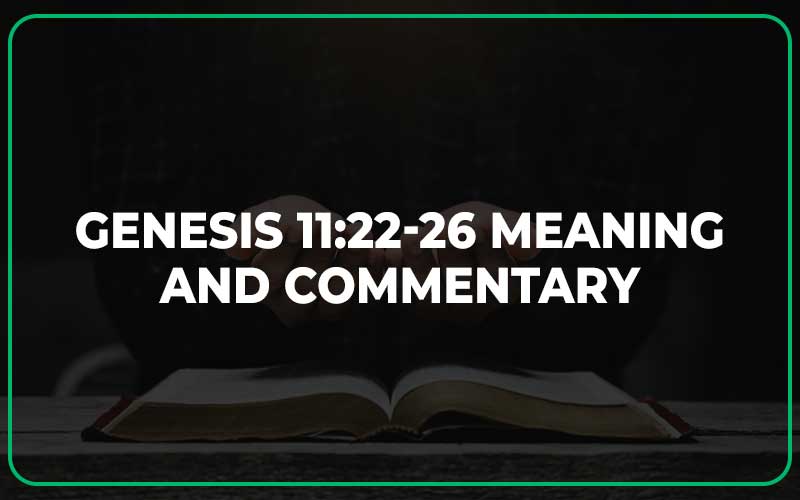Genesis 11:22-26
22 When Serug had lived 30 years, he became the father of Nahor. 23 And after he became the father of Nahor, Serug lived 200 years and had other sons and daughters.
24 When Nahor had lived 29 years, he became the father of Terah. 25 And after he became the father of Terah, Nahor lived 119 years and had other sons and daughters.
26 After Terah had lived 70 years, he became the father of Abram, Nahor and Haran.
Genesis 11:22-26 Meaning
The Bible verses in Genesis 11:22-26 offer a glimpse into the genealogy of Shem, one of Noah’s three sons. They provide a historical account of Shem’s descendants and their families. This passage helps to establish a connection between the previous narrative of the Tower of Babel and the story of Abraham, who will later become the father of the Israelite nation.
Genesis 11:22-26 Commentary and Explanation
In Genesis 11:22-26, we are provided with a genealogical account that traces the lineage from Serug to Terah, ultimately leading to the birth of three significant figures: Abram, Nahor, and Haran. While at first glance, this passage may appear to be a mere list of names and ages, it carries profound spiritual and historical significance.
First, we encounter Serug, who became the father of Nahor at the age of 30. Serug’s long life of 200 years after Nahor’s birth is a reminder of the longevity of the early patriarchs, which is a recurring theme in the book of Genesis. This remarkable lifespan serves as a testament to God’s providence and the fulfillment of His promises, as seen in the lives of Serug and his descendants.
Nahor, Serug’s son, is the next individual mentioned. He becomes the father of Terah at the age of 29 and lives for a total of 119 years afterward, again highlighting the prolonged lifespans of this era. This genealogy underscores the importance of each generation leading up to the birth of Terah, who plays a pivotal role in biblical history.
Terah is the most prominent figure in this passage, as he is not only the father of three sons—Abram, Nahor, and Haran—but also the grandfather of Isaac and the great-grandfather of Jacob, who later becomes Israel. This lineage is crucial in tracing the chosen line through which God would fulfill His covenant promises to Abraham and his descendants (Genesis 12:1-3).
The birth of Abram is particularly significant, as he becomes one of the central figures in the Bible. Abram’s faith, obedience, and willingness to follow God’s call mark the beginning of a new chapter in salvation history. Through Abram, God establishes the Abrahamic Covenant, promising to bless all nations through his descendants (Genesis 12:2-3). This covenant is an essential thread that runs throughout the Bible and is fulfilled in the person of Jesus Christ (Galatians 3:16).
This passage in Genesis 11:22-26 demonstrates the meticulous record-keeping of genealogies in the Bible. These genealogies serve to authenticate the historical accuracy of the events and people mentioned in Scripture. Furthermore, they emphasize the continuity of God’s plan and His faithfulness to His chosen people.
As we reflect on this passage, it reminds us of the intricate tapestry of God’s providence woven through the generations. It reminds us that God’s promises are fulfilled over time, often through unexpected individuals and in ways that may seem improbable to us. We can trust in God’s faithfulness and sovereignty, just as He remained faithful to His covenant with Abraham and continues to be faithful to us today.
Also Read: Genesis 11:10-15 Meaning and Commentary
Context of Genesis 11:22-26
These verses are part of the larger narrative in Genesis that follows the account of the Tower of Babel. After the dispersion of the people across the earth due to their rebellion against God, the focus narrows down to the genealogy and lineage of Shem. These genealogies serve to bridge the gap between the global events at the Tower of Babel and the specific calling of Abraham.
Lessons From Genesis 11:22-26
While it may be tempting to skip over these genealogical records, they serve several purposes in our understanding of God’s plan. They remind us of His faithfulness to His promises and His commitment to continuing His redemptive plan through specific lineages.
They also highlight the importance of obediently passing down God’s truth and heritage from one generation to the next. Moreover, they provide us with a historical context for the later events in Genesis, such as the calling of Abraham. These verses remind us that God works through the generations, and our faithfulness and obedience have an impact on the course of His plan.
Read the Full Genesis 11 Meaning and Commentary
Final Thoughts
As we reflect on these verses from Genesis 11:22-26, let us be reminded of God’s faithfulness throughout history. Just as He preserved Noah and his family during the Flood and established the nations through Shem’s lineage, He continues to work out His plans in our lives today.
These genealogies also show us the importance of passing down our faith to future generations and living in obedience to God’s commands. May we remember that every life is significant in God’s plan, and our faithfulness has the potential to impact generations to come. Let us trust in God’s sovereignty and commit to living out His purposes in our own lives.

